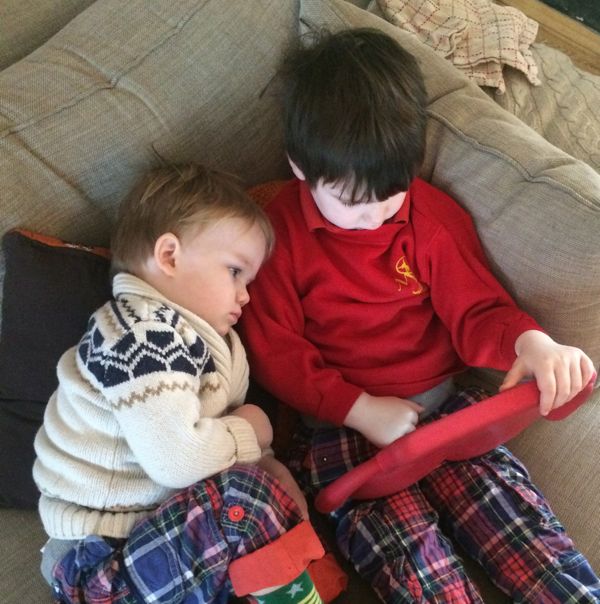
This was taken after both of the boys had had longer mornings at preschool and nursery – they were having some wind down time and decided to cuddle up and share. It struck me that Reuben seemed to empathise with Toby’s need to just rest and ‘chill out’ something that has only started to occur recently.
Having two little boys at different stages of development and working in the children’s retail sector for so long, I’ve picked up a fair few bits and bobs about how children develop socially and what we can do to help them. I’m not saying I’m a child development expert – I’m not by an stretch of the imagination – but I do have experience with how my children and their little friends interact.
I thought about this last week and I think it’s funny how children learn to notice each others emotions – take for example when a child is upset and throwing a temper tantrum in a supermarket. Every child I have ever seen (Toby and Reuben are so funny at this) look at the child like it has two heads. You can see, they are trying to figure out why the child is doing what they are doing. Why are they letting out their emotions in that way? Are they playing? Are they sad? Only recently, Toby has started to show empathy in this kind of situation – he will often bend down to the tantrum thrower and ask (in his toddler babble) what is going on. I think around the age of 2 – 2.5 is the time that children start to recognise other’s emotions and empathise with them, would you agree?
Before the age of 2, we can tell that children do associate facial expressions with certain emotions, they cry at a frown, laugh for a smile. I’m not so sure that they can actually empathise though. Take example Edith, when her brothers are throwing temper tantrums (which they do frequently) she doesn’t start to cry or get upset, and she doesn’t if she hears their laugher, but if you frown at her or smile, she responds accordingly. I do believe that this is something that only comes once your child starts to make ‘friends’ and I think understanding emotions is a fundamental part of building good social relationships and behaviour – think about all those smacking, biting, pinching or whatever episodes that children go through, it’s only once they understand that these actions have consequences and that they hurt or affect others that they grow out of this phase.
One of the most important things for encouraging children to empathise (which is so important for helping them to build relationships with their peers) is talking to them about emotions. I’ve always been a big believer that you shouldn’t try to shield children from any emotion – good or bad. If you are crying or upset, explain that feeling to your child, even if they are only 1 or 2 years old. I have often said to Reuben that I am crying or sad because my heart is hurting, over a variety of reasons, but I’ve reiterated that it isn’t something to be ashamed of or worried about. Showing them emotion cards or asking them about their emotions and if they can explain them can also help a lot it gives children the chance to talk about emotions before they are feeling them.
What are your thoughts on helping children to understand emotions? Did you do anything or do you disagree? I’d love to know your thoughts 🙂
Harriet x


